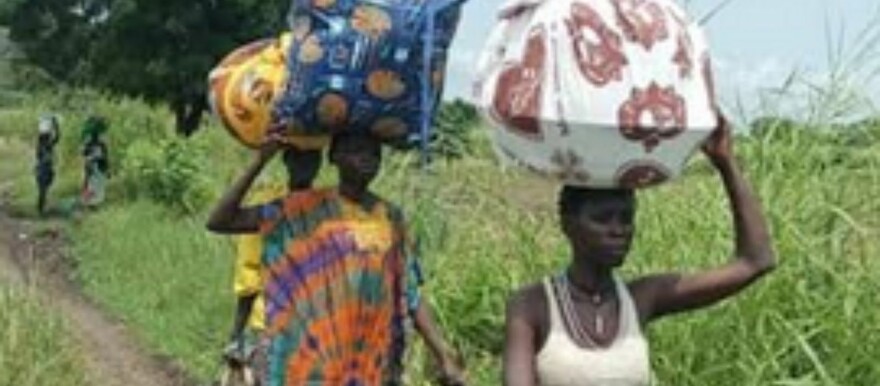South Sudan’s Pochalla Town along the border with Ethiopia has recently been the scene of violence and displacement, as clashes erupted between SSPDF soldiers and armed local civilians on 18 September, forcing women and children to flee their homes and seek shelter in surrounding villages and in neighboring Ethiopia.
The displaced population is now facing significant challenges in meeting their basic daily needs.
The fighting was triggered by the killing of Col. Okony Okwom Othow, the former SSPDF commander in Pochalla which is part of the Greater Pibor Administrative Area (GPAA). Two weeks after the incident, thousands of internally displaced persons (IDPs) continue to find themselves in dire situations and unable to return home due to fears of further attacks.
Several women who spoke to Radio Tamazuj shared their desperate pleas for aid as their livelihoods were destroyed by the three days of intense fighting.
Margaret Akulei said that they are sleeping under trees without access to food or water. She also shared concerns about the deteriorating health of their malnourished children who have since developed diarrhea and vomiting.
“We are suffering and sleeping under trees without food or even jerry cans for collecting water from the river. I left the Ashari area because of airstrikes by SSPDF helicopter gunships which left at least 5 houses burnt in my neighborhood. I do not know about the other suburbs,” she said. “Our children are now getting malnourished and there are many cases of diarrhea and vomiting.”
Another displaced woman, Akumu Peter Omot, appealed to the government to take action and ensure their voices are heard. She narrated the harrowing journey they had to endure through the bushes until they reached Nyium near Ethiopia where she says there is no food and shelter and they live in constant fear of abductors.
“We trekked through bushes until I was exhausted. We made it to a place called Nyium near Ethiopia but we lack food and shelter, and we fear being abducted,” she explained. “We have been isolated from the rest of South Sudan since 2005 without services or development. We work by our hands for our livelihoods but now we are displaced and monkeys are eating up our crops and nothing is left.”
“Our appeal is that our grievances should at least be heard so that we peacefully return home and start new lives even if we are not provided relief aid,” Akumu added.
Meanwhile, a woman leader in Pochalla, Ariet Ochalla Cham, echoed the call for aid and expressed concerns about their unsanitary living conditions. She shared stories of women giving birth and suffering miscarriages during their escape.
“We were fleeing so no one carried with them any food, utensils, clothing, or mosquito nets. While fleeing the town, 13 women gave birth and 12 more women suffered miscarriages because it is not easy for a pregnant woman to run and the sounds of airstrikes were very loud,” she narrated. “We had to spend trying to reach Nyium and later moved to Opra. These women are here with us in the bush without medical attention or mosquito nets.”
For his part, Achau Chapar, the Pochalla Relief and Rehabilitation Commission (RRC) coordinator, acknowledged the dire situation that the fighting ushered in, leaving residents helpless.
He reported that more than 10,000 people, mainly women and children, were displaced without access to food or shelter.
“We conducted an assessment with Tear Fund, For Africa, and Finn Church Aid (FCA), and our reports will be made public in the coming days,” he said. “But according to my observation, about 2000 huts were destroyed or damaged because the bombardment was very heavy. So, the priority is shelter, food, and health.”
Acting Pochalla County Commissioner Owety Olung confirmed that relative calm has been restored and called for urgent humanitarian intervention.
He revealed that over 1,500 houses were burnt and women are currently displaced without food, shelter, or necessary medical supplies.
Olung also appealed to President Salva Kiir to form an investigation committee to address the root causes of the Pochalla conflict and find an amicable solution to the community’s concerns.




